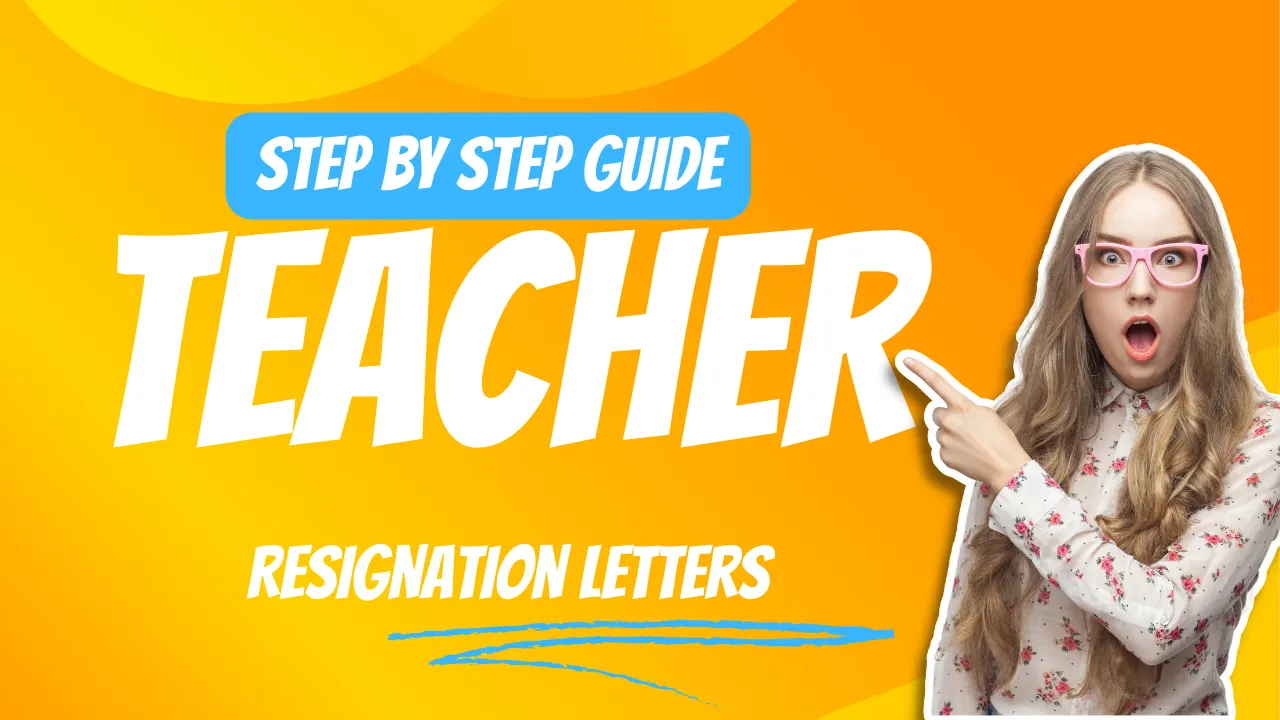

As a teacher, resigning from your job can be an emotional and challenging experience. However, writing a resignation letter is an essential part of the process that should not be overlooked.
A well-crafted resignation letter can help you maintain a positive relationship with your current school administration and colleagues, while also ensuring that future career opportunities remain open to you.
In this blog post, we will go over everything you need to know about writing an effective teacher's resignation letter. We will discuss the importance of professionalism in resignation letters, steps to writing an effective teacher's resignation letter, elements to include in a teacher's resignation letter, how to navigate difficult scenarios and legal aspects of resignations, and considerations on writing your resignation letter based on the recipient.
By the end of this post, you will have all the information you need to write a professional and effective resignation letter that ensures a smooth transition for both you and your current school community.

A teacher's resignation letter serves as a formal means of communicating their decision to leave their current teaching position. It not only helps to maintain professional relationships but also allows for a positive exit from the school year.
By providing proper notice to the school administration, a teacher's resignation letter ensures a smooth transition for both the teacher and the school. This official document signifies the end of the teacher's current role and should be crafted effectively using a teacher resignation letter template to structure it.
Taking these steps can make the process of leaving a teaching position more professional and organized.
Take the hassle out of writing your resignation letter and so much more with our 100+ AI Educator Tools. Check it Out FREE Here.

Maintaining professionalism in your resignation letter is essential for several reasons. Firstly, it demonstrates your professional approach to the resignation process, reflecting positively on your character and work ethic.
Secondly, it conveys a sense of respect and gratitude towards the school administration, acknowledging the opportunities provided by them. This can enhance your reputation as a teacher, both within the school community and with future employers.
Lastly, a professional resignation letter showcases your commitment to the teaching profession, even as you transition to a new job. Using a formal resignation letter template can help you maintain a professional tone throughout the letter.
A well-written resignation letter can have a significant impact on your future career prospects. By expressing gratitude and fond memories of your teaching position, you leave a positive impression on potential opportunities. It also allows you to depart the school district on good terms, which can open doors for future references and recommendations.
Additionally, a professionally crafted resignation letter ensures a smooth transition and a positive last day of work. It serves as a formal conclusion to your current role and paves the way for the next step in your teaching career.
To write an effective teacher's resignation letter, there are several key steps you should follow.
First, identify the recipient of the letter, whether it be the school board or the school administrators.
Next, check your contract to determine the stipulated notice period for resignation. This will help you plan when to submit your letter.
Additionally, you'll need to decide on the final day of work at the school, taking into consideration the school year and ensuring a smooth transition process.
To ensure your letter is well-structured, it's recommended to use a resignation letter template as a guide.
Make sure to follow the proper format, including your contact information, a formal greeting, the body of the letter, and a professional closing.
By following these steps, you can create an effective and professional resignation letter.
When writing a resignation letter as a teacher, it is essential to address it to the appropriate school administrators, school board, or district personnel. This ensures that the letter reaches the proper authority to process the resignation smoothly.
If available, using official letterhead adds a professional touch to the resignation letter. To determine the proper contact information, it is important to follow the guidelines outlined in the school's employee handbook or policy.
By properly identifying the recipient of the letter, you can ensure that your resignation is handled in a professional manner.

In order to ensure a smooth transition process, it is crucial to review your teaching contract and determine the required notice period for resignation. Adhering to this notice period not only demonstrates professionalism, but it also allows the school administration to plan accordingly.
Take into consideration the school year and the time needed for an effective transition when deciding on the notice period. By checking your contract and providing adequate notice, you can navigate the resignation process in a professional manner.
When it comes to determining your final day at school, coordination with the school administration is crucial.
Consider factors such as the school year, teaching responsibilities, and the transition process. It's important to ensure that your final day allows for a smooth handover of duties to the next teacher.
Be sure to communicate your final day clearly in the resignation letter to avoid any confusion. By working closely with the school administration, you can determine the best final day that aligns with the needs of both parties.
When writing a teacher's resignation letter, it is important to include certain elements to ensure clarity and professionalism.

When writing a resignation letter as a teacher, it's essential to include certain information to ensure clarity and professionalism.
Start by including the date of the letter to document the official notice period. Provide the school's contact information, including the school name, address, and contact person's details.
Address the letter with the proper salutation to the school administrators, school board, or district personnel. Clearly state your intention to resign, mentioning your teaching position and the school name.
Lastly, provide the effective date of resignation, indicating the last day of work as per the notice period.
When writing your resignation letter, it's important to include all the essential information in a clear and professional manner. Begin by addressing the recipient with a formal salutation, such as "Dear [Recipient's Name]."
Clearly state your intention to resign, using a professional tone and mentioning personal reasons or a new job opportunity. Express gratitude to the school administration, colleagues, and students for their support, opportunities, and memories.
Provide the effective date of resignation based on the notice period to allow for a smooth transition process. Finally, close the letter with a professional closing, such as "Sincerely" or "Best regards," followed by your signature.
Expressing gratitude for the opportunity is an important aspect of writing a resignation letter. It is essential to thank the school administration for giving you the chance to work as a teacher.
Show appreciation for the valuable experiences gained during your time at the school and acknowledge the role the school has played in your professional growth and development. Additionally, express gratitude for the support received from colleagues and the school community. Highlight the positive impact the school has had on both your personal and professional life.
Expressing gratitude for the opportunity is an important aspect of a teacher's resignation letter. It allows teachers to show appreciation for the experiences, growth, and development they have gained during their time at a school.
It is also an opportunity to thank the school administration, colleagues, and students for their support and positive impact on their teaching career. By extending heartfelt appreciation and acknowledging the guidance and opportunities provided by the school community, teachers can leave a lasting impression.
They can express gratitude for the memories, relationships, and skills acquired, demonstrating their sincere appreciation for the opportunity to be a part of the school community.
During the transition period, it is important to offer assistance to ensure a smooth handover process for the new teacher. Providing contact information allows for any questions or clarifications to be addressed promptly.
Preparing a transition document or handbook can help the new teacher get acquainted with the teaching position and school policies. Expressing a willingness to provide a proper notice period shows commitment to allowing the school enough time to find a suitable replacement.
Lastly, assuring the school of a positive and professional transition process reinforces a sense of trust and collaboration.
During the transition period, it is crucial to offer assistance to the new teacher to ensure a smooth handover. You can work closely with them, providing any necessary support or information they may need to seamlessly step into the role.
Additionally, you can prepare a comprehensive transition document to help them understand the teaching position, curriculum, and school policies.
By providing a proper notice period, you allow the school adequate time to find a suitable replacement and ensure a smooth transition of teaching responsibilities. Rest assured, your commitment to a positive and professional transition process will be evident.
Feel free to contact me via email or phone for any further assistance or support needed during this period.
Navigating difficult scenarios and legal aspects of resignation requires handling disagreements with school administration professionally and calmly. It is important to understand the legal considerations, such as the notice period, resignation letter, and exit interview process.
Despite difficult circumstances, it is crucial to maintain positive relationships and leave on good terms. Documenting the resignation process properly involves using an official resignation letter template and adhering to the proper notice period.
It is essential to highlight the opportunities for future growth and professional opportunities, even in challenging times of resignation.

When faced with disagreements with school administration, it is crucial to maintain a professional and respectful approach.
Prioritize the best interests of students and the school while addressing these issues. Actively listen to understand the administration's perspective and communicate with empathy to foster resolution.
If necessary, involve a mediator, professional organization, or school board to facilitate a fair and constructive outcome.
Document every step taken to resolve the disagreement, including the nature of the issue and final outcome. In case the matter escalates, consider seeking legal advice to safeguard personal rights and professional reputation.
When resigning as a teacher, it's important to familiarize yourself with the notice period requirements outlined in the employee handbook, teacher contract, or school district policies.
Follow the proper resignation process by submitting a formal letter of resignation to the school administration, stating your last day of work, contact information, and reasons for resignation, if necessary. Be prepared for an exit interview, where the school administration may seek feedback, discuss your reasons for leaving, and provide final instructions.
Throughout the resignation process, maintain a positive and professional attitude, as both your resignation letter and the exit interview are official documents. Understand the potential rights, obligations, and opportunities that may arise from your resignation, including future job prospects, professional relationships, and personal growth.
When composing your resignation letter, it's important to tailor the content to the specific recipient. If you're addressing a principal, take into account your professional relationship, the school culture, and the reasons for your resignation.
For a letter to parents, focus on effective communication, empathy, and maintaining a positive tone. Personalize your resignation letter by addressing the recipient and expressing gratitude for the support you've received from the school administration, teaching staff, or parents.
Remember that a well-written resignation letter can leave a lasting impression, build a professional network, and open up future opportunities. Use a template as a starting point, adapting it to the unique circumstances of your resignation, the school, and your teaching position.
When adjusting your resignation letter to a principal, it is important to acknowledge the professional relationship you have with them. Express gratitude and emphasize the positive experiences gained as a teacher under their leadership. Highlight the reasons for your resignation, providing a genuine context to the letter.
Offer to work collaboratively with the principal to ensure a smooth transition and maintain positive professional relationships with the school community. It's also important to express a willingness to follow the school district's policies and legal requirements. Maintain a professional and empathetic tone throughout the letter.
Crafting a teacher resignation letter to parents requires thoughtfulness and professionalism.
Start by addressing the parents respectfully, expressing gratitude for the opportunity to work with their children. Next, explain the reasons for your resignation, whether they are personal circumstances or professional opportunities.
Assure the parents that you are committed to ensuring a smooth transition process and have the best interests of the students at heart. Offer your contact information, showing willingness to answer any questions or provide support during the transition period. Throughout the letter, maintain a professional demeanor and show empathy towards the parents' concerns.
When writing an educator resignation letter for personal reasons, it is important to clearly state the reasons for resigning in a professional and concise manner.
Express gratitude towards the school, colleagues, and administration for the opportunities and support provided during your tenure.
Offer assistance to ensure a smooth transition, such as training a replacement or providing a transition document. Remember to include contact information for future communication or reference requests.
Finally, end the letter on a positive note, expressing fond memories and best wishes for the school's future.
Timing plays a crucial role in the impact of a teacher's resignation on future career opportunities. Giving proper notice and resigning at the end of the school year leaves a positive impression, allowing for a smooth transition and maintaining professional relationships.
Resigning mid-year may require following formal processes and could affect future prospects. Timely resignation allows for effective planning by school administration.
When writing a teacher resignation letter due to marriage, it is important to convey your decision in a professional and concise manner. Start by stating that you are resigning due to personal reasons, specifically, your marriage, without going into unnecessary details.
Express gratitude towards the school, administration, and colleagues for their support and the opportunities they have provided you. Offer to assist in the transition process by ensuring a smooth handover of responsibilities to the next teacher. Provide your contact information for future communication or reference requests.
Finally, end the letter on a positive note by expressing appreciation and best wishes for the continued success of the school.
When writing a resignation letter to the superintendent as a teacher, there are several key elements to include. Begin by addressing the letter directly to the superintendent and clearly stating your intention to resign from your teaching position.
Express gratitude to the school district, administrators, and colleagues for the opportunities and support you have received. Offer to work collaboratively to ensure a smooth transition process, such as by training a replacement teacher.
Provide contact information for future communication or reference requests. Finally, end the letter on a positive note, expressing fond memories of the school district and best wishes for the future.
Teachers are expected to give at least two weeks' notice before resigning, although more notice is appreciated. It's important to check your employment contract or union agreement for specific requirements. When resigning, provide a professional and polite resignation letter to the school administration.
Writing a resignation letter is a professional way to notify the school administration of your intention to leave. It helps create a paper trail and ensures that everyone is on the same page regarding your departure date and reason for leaving. A well-written resignation letter can help maintain positive relationships with colleagues and potential future employers. Not submitting a resignation letter can damage your reputation and may affect future job prospects.
Properly resigning from teaching requires giving sufficient notice, typically two weeks, and submitting a formal resignation letter. Express gratitude for the opportunity and offer assistance during the transition period.
When leaving a teaching position, it's essential to inform the school administration or HR department. Notify your students' parents and colleagues as well. Follow the school's policy for submitting a written resignation letter if required. Give ample notice and adhere to proper procedures before leaving.
It is not necessary for a teacher to disclose the reason for resigning in their letter. However, if desired, it should be kept brief and professional. Expressing gratitude towards the school administration and colleagues is important. Resignation letters should be submitted in advance based on contract or school policy.
It is absolutely appropriate to express gratitude towards specific colleagues or students in a teacher's resignation letter. Personalized thank-you notes can add a heartfelt touch to the letter, but it is important to maintain a professional and gracious tone. Avoid any negative comments or criticisms.
While it's not necessary, offering to help find and train a replacement in a teacher's resignation letter can leave a positive impression. Clear details about the extent of assistance should be provided. Ultimately, it's up to the individual teacher to decide whether or not to offer help.
Resigning mid-year as a teacher can have repercussions for the school and students. Giving ample notice and minimizing disruptions is crucial. The school will need to find a replacement, which takes time and may affect education quality. Students might face temporary setbacks adjusting to a new teacher and teaching style.
When writing a resignation letter as a teacher, it is best to maintain a professional and respectful tone. Avoid being overly apologetic or emotional, as this can come across as unprofessional. Keep the tone neutral, but express gratitude for the opportunities and experiences gained while teaching. Be clear and concise about your reasons for resigning without going into too much detail.
Submitting a resignation letter for teachers is best done at the end of the school year. It is important to give ample notice, preferably at least two weeks in advance. Submitting early helps your employer find a replacement teacher before the next school year starts. Express gratitude and professionalism in your letter.
In conclusion, writing an effective resignation letter as a teacher requires professionalism and careful consideration. It is important to express gratitude for the opportunity while also offering assistance during the transition period.
Additionally, it is crucial to navigate difficult scenarios and consider any legal aspects of resignation. Depending on the recipient of the letter, adjustments may need to be made to cater to a principal, parents, or superintendent. Timing can also impact future career opportunities, so it is essential to plan accordingly. Remember, your resignation letter can leave a lasting impression, so take the time to craft it thoughtfully and professionally.